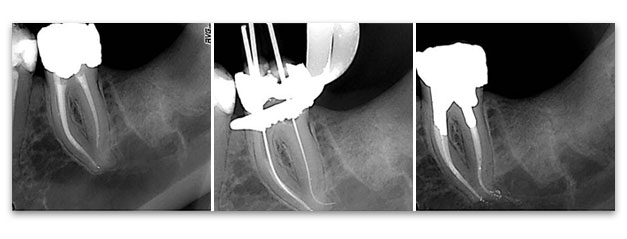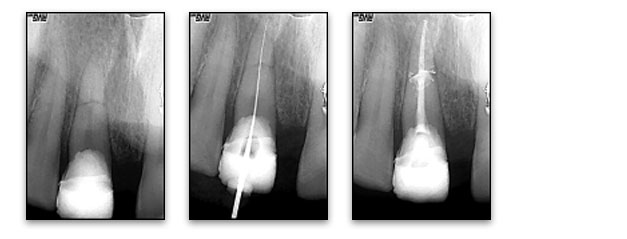Reasons to be Seen by an Endodontist
Dr John Lordan outlines some situations when you might need to see an Endodontist for your root canal treatment.
Root canal treatment is indicated when a nerve has become irreversibly damaged resulting in acute pain and eventually an abscess in the tooth.
Root canal treatment is a means of relieving pain and retaining your tooth for life if properly treated and restored thereafter.
Most root canal treatments are undertaken successfully by your general dentist but there are some situations when the services of a root
canal specialist (Endodontist) are called for:-
1 Complex tooth anatomy
The further back the tooth is in your mouth the more complicated the root canal treatment becomes with multiple roots and narrow canals.The access to these teeth is difficult and improved visibility and light through an operating microscope ensures a better result. The endodontists office is fully equipped to get the best results in these situations.
A 22 year old male was referred by his dentist as an emergency patient with acute pulpitis on a recently restored maxillary molar which had kept him awake at night with pulsating throbbing pain. We saw the patient and carried out pulpotomy as a first stage palliative procedure and the patient was scheduled for RCT two days later. The symptoms had subsided almost immediately and the RCT was completed and the patient was referred back to his dentist for continuing treatment on the carious adjacent premolar.

2 Difficulty with Anaesthesia
Acutely inflamed tooth pulps need a focused staged approach to achieving successful anaesthesia and ensure your treatment is completed in comfort. Dr Lordan utilises all the latest anaesthetic techniques to achieve full anaesthesia.
3 Retreatment Cases
Failing root canal treatment will often respond to retreatment by an endodontist through identification of the cause of failure and treating the tooth accordingly. Over 50% of the cases referred to endodontists are retreatment cases which are treated with successful results.
A 38 year old female patient was referred in pain with a previously root filled lower left molar. On examination the tooth was extremely tender to touch and there was buccal swelling present with suppuration and exudate at the gingival margin in the furcation region. There was no evidence of vertical fracture present and radiographically the root canal treatment was sub-optimal particularly on the mesial roots.
Retreatment was carried out with copious irrigant exposure and activation with passive ultrasonics and the access cavity was restored with dual cured composite material. The patient was put on antibiotic therapy and the symptoms had markedly improved 24 hours after treatment and subsided completely within one week. Follow up radiograph shows complete resolution of the furcation bone loss and the patient was advised to have a cast restoration with her referring dentist

A 52 year old was referred for retreatment on a poorly obturated mandibular first molar which was symptomatic and scheduled for a crown. The anatomy was successfully negotiated and RCT completed with amalgam core build-up and the patient was returned to his own dentist for ongoing treatment.

4 Traumatic Dental Injuries
Traumatic dental injuries with pulp (nerve) exposure have better treatment outcomes if dealt with in an endodontic office
A 38 year old male was referred after traumatising upper right central incisor with horizontal fracture evident in the apical third of the root. The tooth was stable but occasionally symptomatic particularly to heat stimulus. The tooth was anaesthetised and access to apical terminus was uneventful and after copious irrigation with Sodium Hypochlorite the tooth was obturated and the patient returned to the referring dentist for final restoration.

5 Medically Compromised Patients
Patients who are medically compromised are assured the best possible outcome in the shortest time frame by having their treatment carried out in an endodontic office. This includes patients undergoing chemotherapy or patients with cardiac valve issues as well as patients about to undergo orthopaedic surgery for joint replacement. Patients on bisphosphate therapy for the treatment of osteoporosis should also consider having any root canal treatment done by an endodontist.


